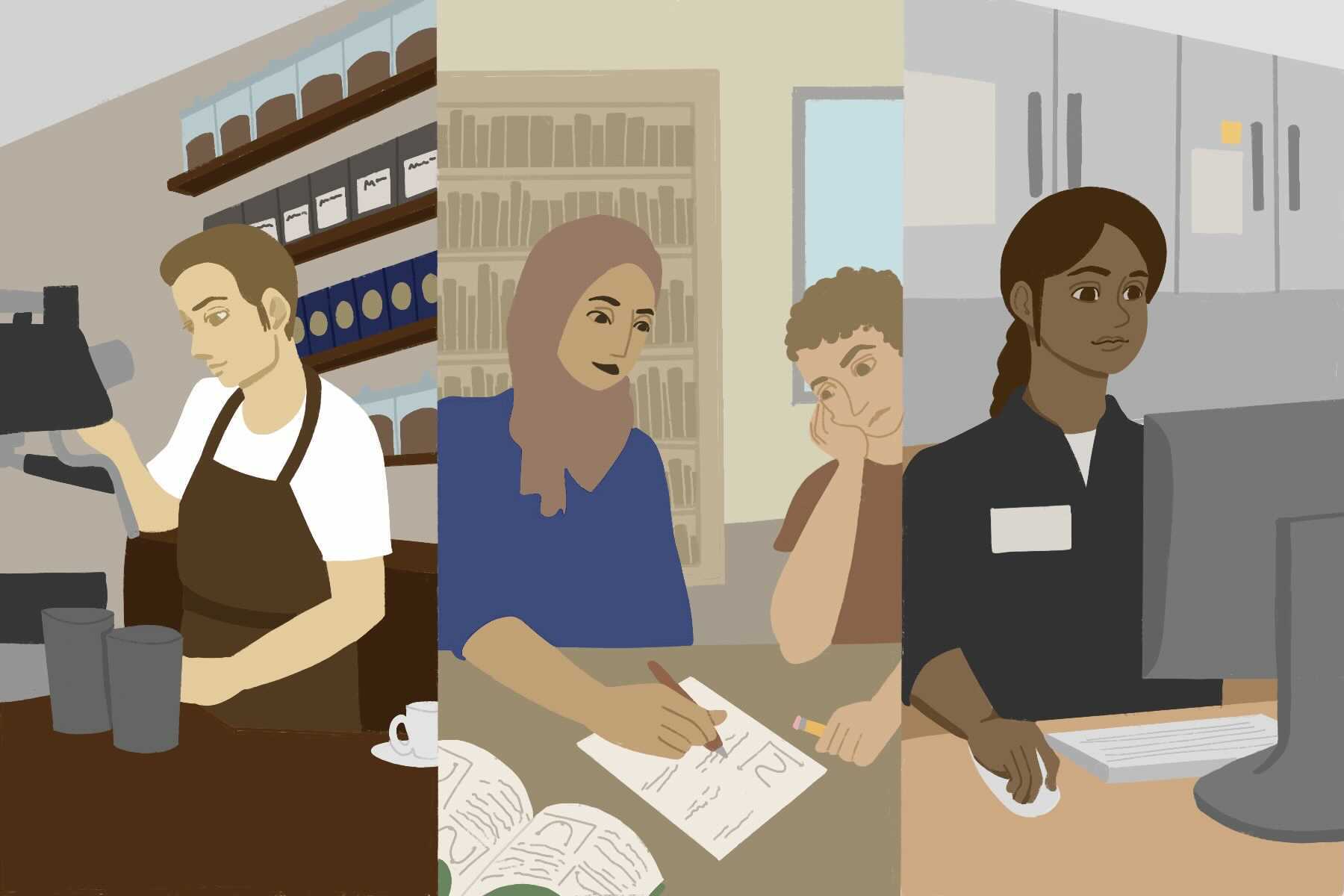Whether students take part in an internship, a work-study program or even a job independent of school affiliations, adaptation is key to understanding a new set of rules. However, with the importance of student employment in mind, is also vital to recognize the full impact that the last couple of years have had on students’ practical job options, as well as their chosen fields of study.
Work-Study Programs
During the thick of the pandemic, many campus offices and programs shut down, eliminating the need for students to manage housing, serve meals and work on administrative tasks. As a result, students had fewer work-study positions to apply for and, if selected, they worked fewer hours. Some schools kept their students employed and continued to pay their student workers through hard times; others shut down parts of their programs and cut costs. Since the price of tuition and other educational expenses stayed the same, students either had to rely more heavily on federal aid or search for employment outside of school.
Work-study programs offer an array of practical benefits to a wide range of students from different backgrounds. Most often, these student employment opportunities provide the crucial financial support needed to continue attending school, especially for individuals who suffer acute financial hardship or have to support their families in addition to attending college. Taking on work-study opportunities also allows students to take control of their financial future. Over the course of four years, students accumulate thousands of dollars in debt that they will need to repay within six months of graduating or dropping below a certain threshold of enrollment. Extra money goes a long way toward alleviating financial stressors and giving scholars more time to look for student employment opportunities that suit them after graduation.
Work-study programs also equip students with intangible benefits in the form of work experience. When applying for internships and even entry-level student jobs, work experience gives students a slight edge over their competitors in a crowded workplace. Assembling a resume requires students to demonstrate initiative in learning new skills, and working through college provides that in spades. Thus, it is paramount that work-study programs come back in full force.
Internships
Internships tie into life during school as well as after school ends, as they offer both paid and unpaid opportunities for students to explore their areas of interest. Students need to learn what they want to do and what they don’t want to do, and both of these ideas are a function of experience; certain skills just cannot be acquired in the classroom.
Often, college programs require students to complete internships that deepen or broaden students’ chosen areas of study. Certain programs for undergraduate majors — such as journalism — require students to complete internships with local or digital publications to earn credits. For master’s and Ph.D. programs, internships are even more central to getting the most out of one’s studies and graduating on time. On-the-ground experience factors into research projects in the form of reflection and problem-solving. It also prepares students to deal with the logistical and emotional challenges associated with different areas of work.
Students may also choose to pursue an internship voluntarily to get out of their comfort zone. Unfortunately, it was difficult to travel during the pandemic and experience different cultures, which can be essential to understanding philanthropic work. Also, opportunities in more specialized, collaborative fields of work were off the table. Since students could not gather in a shared workplace, it was more challenging to truly understand the value of collaboration, negotiation and compromise in the pursuit of larger goals.
There are also some benefits to pursuing internships during the pandemic. Relying on technology for communication may encourage accountability among participants, pushing them to more actively communicate what they need and want. It may also make interns more flexible because they have more empathy for their fellow colleagues. A smaller number of roadblocks may crop up in digital and remote workplaces than those that are in-person. Likewise, fewer inconveniences may be welcome to people who are new to a business, and some stressors may be alleviated by the different conditions people currently live in.
Part-Time/Full-Time Work
Outside of insular college settings, work comes in many forms. Some students work minimum-wage positions, while others are trying to add to their skills and maintain a professional career; still more are seeking a creative outlet for their passions. Another less recognized type of work is aiding dependents, whether that means supporting siblings, getting children through the rigors of online school or taking care of ailing parents and grandparents. Amid unemployment and health crises, juggling the demands of a career, a personal life and college studies has become harder and harder to sustain.
Hardship can also change a students’ perception of the world, as well as their own desires. While a lot of work is centered around practical concerns such as hours, pay, benefits and availability, students are also starting to consider their individual callings and unique talents. The political and social strife of the last year may have convinced students to hone in on certain areas of advocacy or broaden their awareness of justice issues.
The way business is conducted also took a turn for the unexpected. While access to and use of technology has been on the rise, the strains of the past few years have all but required individuals and institutions to rely on computers, smartphones and television to stay afloat. Employees are needed not only to maintain and fix existing technology but also to develop and advance technology even further.
Conclusion
Perhaps the most drastic reassessment of student employment — whether it be work-study, internships or part/full-time work — came in the form of recognizing a job’s value. Dealing with physical and mental stress has forced students to reflect on the way life before the pandemic made them feel, whether that was positive or negative. This is bound to have a large impact on the professional choices that they make. For some, social isolation has been largely negative: They may feel lost without their previous plans or the structure provided by day-to-day expectations. For others, being alone has encouraged them to instate new boundaries and even helped invent strategies to navigate the workplace more productively and satisfactorily. Perhaps it is about time that the rules have changed.

















